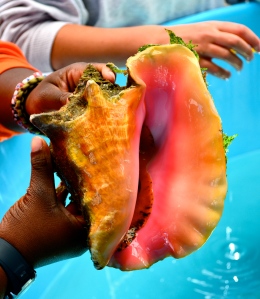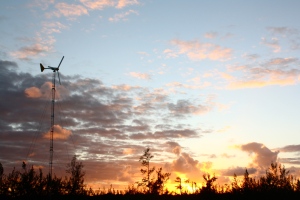The Rosenstiel School for Marine and Atmospheric Science (RSMAS) at University of Miami has announced its new Coastal Sustainability Science and Practice Track through their Master of Professional Science Program. It will be offered for the first time this fall 2012 at the Cape Eleuthera Institute. We are excited to welcome these Masters students to the CEI campus! This course will equip students with advanced training in the expanding field of sustainability, with a combined focus on the practical aspects of systems management and the theoretical understanding of whole-systems design. The goal of this track is to train future leaders who create solutions for sustainability issues at local and global levels. If you are interested in this program or would like more information, visit the program’s website here.
Yearly Archives: 2012
Easter at Island School
Last Friday during Exploration Time, some students and faculty gathered together in the art studio to prepare home made Easter decorations. Sunday, students were given the opportunity to participate in an Easter Service at a nearby church or otherwise simply stayed behind to enjoy the delicious Easter Brunch. Enjoy these scenes from the week:
[slideshow]
Friends Seminary Returns to Eleuthera!
Twelve Upper School students from Friends Seminary in New York City recently traveled to Cape Eleuthera with Science teacher Kerry Kline and Experiential Ed teacher Jack Phelan for an amazing week of hands-on learning and personal challenge. Below are reactions from two students, Simon and Christian. Thanks to our Educators Laura Franklin and Scott Aland for a unforgettable week.
[slideshow]
Simon
When the group first arrived at CEI, there were definitely a few grumbles about the bugs, the lack of water for showering, and the “let it mellow” rule. These qualms quickly disappeared as we got into the heart of the program that made up our stay at CEI. Waking up that very first morning to snorkel the mail boat wreck just off the beach and seeing a juvenile lemon shark hiding among the rotting wood was enough to make us realize just how much this experience would offer. We were not done with lemon sharks either. Not only did we learn about shark physiology and the dangers facing shark populations today from Ian — the Lemon Shark Project manager — but we also assisted Ian, Mike, and Lindsey in their field research of lemon shark nursery mechanics, and we caught the first lemon of the project from Waterford Creek.The research also helped to show us just how misunderstood sharks are — that they are not as dangerous as popular opinion would have us believe. Our work with Dani out on the patch reefs was also successful, doing species counts on two different reefs. Continue reading
Daily Update April 9, 2012
Island School students have had an event filled passed two days. On Saturday night we went to the Rock Sound Homecoming. Homecoming is just a fancy way of saying the settlement wanted to have a festival. Cars lined the street as we pulled into the festivities, and Bahamian rake and scrape music filled the air. We headed towards the food booths, which were selling a multitude of items – conch fritters, crack conch, conch salad, and pizza. A few students tried to impersonate the large man singing, “Pineapple Wine.” We got to meet some of the locals, and had an extremely funny time trying to learn to . Overall, the night was a great adventure with some great entertainment.
[slideshow]
On Sunday, seven students headed to Tarpum Bay for a 3 year old’s birthday party. Our Settlement Day family invited us back for Jake’s birthday with promises of a bouncy castle and food. Continue reading
Lionfish Research in The Bahamas Makes Global Spotlight
[slideshow]
Since its creation just over one year ago, the Lionfish Research and Education Program (LREP) at CEI has strived to become a hub for lionfish work in the Caribbean. Recently, LREP has taken some exciting steps toward reaching this status! Just last week, CEI hosted three producers and videographers from ZED (www.zed.fr), a major French documentary company that is working on gathering footage for an upcoming TV series featuring invasive lionfish. Specifically, the documentary team was interested in learning about Bahamian lionfish research and management initiatives. Luckily, visiting scientist, and partner of LREP, Nicola Smith was able to come over from Nassau to support the week’s activities and be featured in the film! Nicola is the lead coordinator for the Bahamian-wide lionfish research project that operates under the Bahamian Department of Marine Resources (DMR) and partners with CEI.
ZED producer, Jerome Segur, sound engineer, Olivier Pioda, and underwater videographer (and former member of Jacque Cousteau’s prestigious dive team!) Didier Noirot, joined Nicola and LREP researchers in the field to get a closer look at lionfish and to better understand the project’s research objectives. Continue reading
Daily Update April 6, 2012
 Each research group is continuing to make progress in preparation for our group introductions on Saturday. Introductions are short PowerPoint presentations where each project answers the question: Why does our research matter?
Each research group is continuing to make progress in preparation for our group introductions on Saturday. Introductions are short PowerPoint presentations where each project answers the question: Why does our research matter?
Of course being in deep water sharks is super cool. We get to study different shark species using The Medusa – a high-tech video camera designed to dive up to 2000 feet underwater, lent to us by Edith Widder at National Geographic. But what’s even cooler about my research project is how little humans know about what I’m studying!
At home, whenever I was given a research paper or project to do in science class, there was a definite ending point and answer to the project. Continue reading
Daily Update April 5, 2012
In preparation for my three-hour block of Marine Ecology yesterday afternoon, I made sure I had my mask, snorkel, and fins. I started heading over to the boathouse to arrange my dive gear, when a friend let me know that I wasn’t diving that day. I was going to snorkel in mangroves. Mangroves are a type of tree that live in muddy areas in shallow salt water. At high tide, they flood, and juvenile marine species like conch, checkered pufferfish, blue crabs, and blue chromis swim into the mangrove looking for food and shelter. Mangroves act as a sort of nursery for the baby fish. There is a bounty of algae for the fish to feed on and plenty of protection within the prop roots around the mangrove. Continue reading
heading over to the boathouse to arrange my dive gear, when a friend let me know that I wasn’t diving that day. I was going to snorkel in mangroves. Mangroves are a type of tree that live in muddy areas in shallow salt water. At high tide, they flood, and juvenile marine species like conch, checkered pufferfish, blue crabs, and blue chromis swim into the mangrove looking for food and shelter. Mangroves act as a sort of nursery for the baby fish. There is a bounty of algae for the fish to feed on and plenty of protection within the prop roots around the mangrove. Continue reading
Lionfish Research Project Update: The First Week
The first week of research was a big week for the Lionfish research project. We oriented ourselves to our goals, methods, and systems. We discussed what an invasive species means, the invasion of lionfish, their life cycles, and their anatomy. On Thursday, we dissected lionfish in the lab. Our project began with learning external anatomy, including how to prevent lionfish stings. Next cut their bellies and look into the internal anatomy. We saw their key organs, and even their super stretch stomach that makes them such a successful predator. I found it especially interesting when we opened their stomach; we identified their stomach contents. This is especially significant because we identified their stomach contents to determine which species were suffering due to lionfish predation. I really enjoyed our dissection. The following week was our first field day. We went diving on a reef and practiced protocol for surveying a particular reef. The group was really excited to begin their work and get in the water. Stay tuned for new updates from the Lionfish research project!
[slideshow]
Conch Research Project Update: Our First Day in the Field
by Amelia Patsalos-Fox, Shane Wetmore, Sterling Wright
On Saturday we went out to free dive for conch in the shallows near the sandbar to see how many adults we could find. It was a nice first experience for us and it taught us how to find conch even when they are camouflaged in the sand. For the past week we have been focusing on queen conch identification, history of the conch fishery, and ways to survey the population effectively. Our most exciting experience so far has been in the field. We were able to travel out into Cape Eleuthera Sound and take our first peek at some conch. As we snorkeled around, we practiced our free diving and determining live queen conch from dead shells. We mostly saw juveniles and a few sub-adult sizes. We then gathered in a group in the water to practice identifying differences between juvenile and sexually mature conch shells. This was very helpful in learning about the shells. It was extremely hands on and we had the help of a visiting conch researcher, Catherine Booker, from Community Conch, a Bahamian non-profit organization. She had given us a presentation previously on conch in the Bahamas and it was amazing to see her teach us about proper ways spot conch. All in all it was a positive experience and was very helpful towards our future in surveying the density of conchs in the Cape Eleuthera Bite.
[slideshow]
The following week we were able to go out and start experimenting with collecting real data. Our project hopes to identify Continue reading
Daily Update April 3, 2012
 Sustainability is a pillar of The Island School. In every class here, we discuss sustainability, how to achieve it, and how to improve the world and make it more sustainable. Although at home, I’ve had many classes on “going green,” I’ve realized that the concept is much more than just turning lights off when you leave the room. It’s about empowering the current generation to use resources and meet their needs while saving enough for future generations.
Sustainability is a pillar of The Island School. In every class here, we discuss sustainability, how to achieve it, and how to improve the world and make it more sustainable. Although at home, I’ve had many classes on “going green,” I’ve realized that the concept is much more than just turning lights off when you leave the room. It’s about empowering the current generation to use resources and meet their needs while saving enough for future generations.
In Human Ecology on Monday, we started brainstorming ideas of Final Projects. These projects will be about solving problems by creating more ecologically-friendly systems, either on campus or at home. Continue reading
